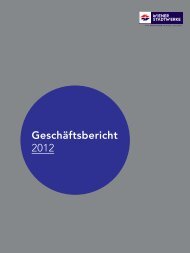Wiener Stadtwerke Annual Report 2012
Create successful ePaper yourself
Turn your PDF publications into a flip-book with our unique Google optimized e-Paper software.
the risk management system. These included performing an<br />
opportunity and risk review which, for the first time, compared<br />
the original opportunity and risk assessments of recent years<br />
with the outcomes which actually materialised. The findings<br />
are now being used to further develop the risk management<br />
system.<br />
Similarly, the discussion and coordination of the most<br />
important opportunities and risks is now included in the annual<br />
business planning meeting of every Group subsidiary in order<br />
to be able to discuss, based on a holistic view, which opportunities<br />
and risks can be anticipated in the coming years and<br />
which, as a result, need to be subjected to close monitoring.<br />
A risk controller function, established at every Group subsidiary,<br />
is responsible for ensuring compliance with the defined<br />
risk management process. This position reports regularly and<br />
directly to the relevant general manager.<br />
The risk landscape of the <strong>Wiener</strong> <strong>Stadtwerke</strong> Group is broken<br />
down into seven risk groups, with the main risks in the various<br />
risk groups being the following:<br />
Financial risks: Covered by a Group-wide<br />
treasury management system<br />
This risk class includes, in particular, those risks associated with<br />
short and long-term investments which are mitigated uniformly<br />
across the Group by means of a treasury management system.<br />
This system monitors the development of these investments by<br />
employing appropriate risk analysis concepts such as value-atrisk,<br />
initiates risk mitigation action, and also prepares reports<br />
for the General Management. Risks associated with US<br />
cross-border lease transactions are kept under close observation<br />
at all times.<br />
Technical risks: Mitigation by means of<br />
regular maintenance and investment programmes<br />
Given the fact that <strong>Wiener</strong> <strong>Stadtwerke</strong> is a group with asset-<br />
intensive operations, the absolute reliability of its technical<br />
infrastructure is a key success factor. For this reason, close<br />
attention is paid to compliance with high technical standards<br />
and carefully defined maintenance and quality checks. The<br />
reliable IT-based support of business processes is ensured by<br />
taking steps to reach an extremely high level of IT system<br />
availability. In addition, risks are minimised by means of<br />
appropriate insurance policies.<br />
Price-related risks in terms of primary energy and electricity:<br />
Risk mitigation via hedge transactions<br />
This category of risks covers fluctuations in the prices of oil,<br />
gas and sourced electricity supplies. In the interests of<br />
professional risk management, Wien Energie mitigates these<br />
price risks by engaging in appropriate hedge transactions,<br />
such as derivative financial instruments covering its source and<br />
distribution markets. Forwards, futures and swaps are used for<br />
these purposes. The development of financial instruments over<br />
time is largely dependent on developments in the relevant<br />
commodities markets. For more information on financial<br />
instruments, please refer to the relevant section in the Notes<br />
to the Consolidated Financial Statements.<br />
32 <strong>Annual</strong> <strong>Report</strong> <strong>2012</strong> | Consolidated Management <strong>Report</strong><br />
Market risk: Risk mitigation through the development of new<br />
products and services<br />
Market risks include price and competition-based risks in the<br />
area of sales. The <strong>Wiener</strong> <strong>Stadtwerke</strong> Group mitigates these<br />
risks by developing new products and services, through a<br />
pro-active, customer-oriented sales policy, and through a<br />
series of partnerships and cooperations.<br />
Environmental risks: Risk mitigation by means of<br />
permanent market monitoring<br />
The relevant political and legal environments are the main<br />
areas in which <strong>Wiener</strong> <strong>Stadtwerke</strong> monitors environmental<br />
risks. These are regularly reviewed in order to be able to<br />
identify risks as early as possible and to react accordingly.<br />
Organisational and personnel risks: IPD as risk mitigation<br />
As a responsible employer, the monitoring of personnel risks is<br />
particularly important for <strong>Wiener</strong> <strong>Stadtwerke</strong>. Therefore,<br />
defined personnel risks are evaluated on a quarterly basis and<br />
compared with a benchmark. Within the scope of the Group‘s<br />
integrated personnel development (IPD) concept, various<br />
methods are used such as, for example, employee orientation<br />
meetings, which are intended to mitigate and/or avoid these<br />
risks.<br />
Internal Control System (ICS)<br />
At <strong>Wiener</strong> <strong>Stadtwerke</strong>, ICS refers to all action and processes<br />
implemented which are aimed at monitoring and controlling<br />
the efficacy and efficiency of commercial operations, the<br />
reliability of financial reporting, and compliance with the legal<br />
requirements relevant to the Group.<br />
<strong>Wiener</strong> <strong>Stadtwerke</strong> maintains extensive documentation of rules<br />
and processes relevant to the ICS which have been evaluated<br />
by a consultancy firm in recent years. In its findings report,<br />
Ernst & young established that <strong>Wiener</strong> <strong>Stadtwerke</strong> documents<br />
its ICS in a way which is appropriate for a company of its size<br />
and complexity. The few areas for potential improvement<br />
identified in the report have been the focus of ameliorative<br />
action.<br />
The entire ICS documentation system now serves as a basis for<br />
ICS internal auditing activities. The aims here are to ensure<br />
that the ICS remains effective, on the one hand, and to<br />
continuously develop the instruments used on the basis of the<br />
audit results, on the other.<br />
With regard to the continuous improvement of the ICS, the<br />
main focus in <strong>2012</strong> lay on the optimisation of the integration of<br />
ICS documentation and the rules of functional separation in<br />
the integrated business software system. In cases in which a<br />
functional separation is not possible for various reasons,<br />
another, compensatory, ICS process ensures that the required<br />
security standards are complied with.<br />
Irregularities discovered during the <strong>2012</strong> financial year (in<br />
particular accusations of price rigging with suppliers at Wien<br />
Fernwärme GmbH) were taken as an opportunity to evaluate<br />
and optimise ICS-relevant processes within the Group.




